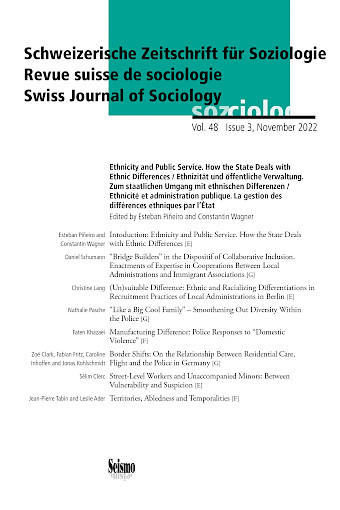Ethnicité et administration publique. La gestion des différences ethniques par l'État
Esteban Piñeiro, Constantin Wagner (dir.)
Dem Verhältnis von «Ethnizität und öffentlicher Verwaltung» kommt besondere gesellschaftliche und politische Relevanz zu. Der (national-)staatliche Verwaltungsapparat schafft spezifische soziale Realitäten, indem er ethnische Kategorien (re-)produziert, programmatisch aktualisiert und institutionell verankert. Wie wird Ethnizität in unterschiedlichen Bereichen der öffentlichen Verwaltung thematisiert und wie organisieren ethnische Unterschiede das Verwaltungsgeschehen mit? Lässt sich Ethnizität tatsächlich als ein signifikantes oder wirkmächtiges Ordnungsprinzip von öffentlichen Verwaltungen oder staatlichem Handeln identifizieren?
Staatliche Einrichtungen verwalten den Zugang zu vielfältigen Ressourcen. Sie erbringen dabei nicht nur Zuwendungen oder Dienstleistungen auf freiwilliger Basis, sondern verfügen häufig auch über besondere Eingriffsrechte, um rechtsstaatliche Vorgaben mit Zwang durchzusetzen. Ethnische Unterscheidungen sind hier von grosser Tragweite, besonders auch in Form von «negativen Klassifikationen», die mit benachteiligenden oder stigmatisierenden Dominanz-Effekten einhergehen können. Die Beiträge im Sonderheft fragen, wie ethnische Unterscheidungen und Kategorisierungen in Verwaltungsprozessen situativ mobilisiert, aber auch (im Sinne eines Undoing Ethnicity) verwischt oder banalisiert werden und wie sich Ethnisierungen mit weiteren arbeits- bzw. verwaltungsbezogenen Unterscheidungen und Kategorisierungen vermengen.
Die im Heft präsentierten Studienergebnisse bieten einen breiten Einblick in die aktuelle qualitative Sozialforschung zur Wahrnehmung von und dem Umgang mit Ethnizität in unterschiedlichen Bereichen der staatlichen Verwaltung in Deutschland und der Schweiz. Ihnen gelingt es, die soziale Konstruktion und Reproduktion ethnischer Humandifferenzierungen zu thematisieren, statt sie als fait social zu behandeln. Solche Analysen sind notwendig, wenn sich die Soziologie nicht an der reflexionsbedürftigen und politisch folgenreichen Verfestigung ethnischer Kategorisierungen beteiligen will.
L'analyse du lien entre l’ethnicité et l’administration publique est particulièrement pertinente sur le plan social et politique. L'appareil administratif de l'État (national) crée des réalités sociales spécifiques en (re)produisant des catégories ethniques, en les actualisant de ma-nière programmatique et en les ancrant dans les institutions. Comment l'ethnicité est-elle thématisée dans différents domaines de l'administration publique et comment les différences ethniques organisent-elles le fonctionnement de l'administration ? L'ethnicité est-elle un prin-cipe d'organisation significatif ou efficace de l'administration publique ou de l'action de l'État ?
Les institutions publiques gèrent l'accès à de multiples ressources. Elles ne se contentent pas de fournir des subventions ou des services sur une base volontaire, mais disposent sou-vent de droits d'intervention spécifiques pour faire respecter les règles de l'État de droit par la contrainte. Les distinctions ethniques ont dans ce cadre une importance significative, no-tamment lorsqu’elles s’incarnent dans des formes de classification négative qui reflètent des rapports de domination stigmatisants. Les articles de ce numéro spécial analysent d’une part comment les distinctions et les catégorisations ethniques sont opérationnalisées dans les processus administratifs, d’autre part comment elles sont estompées ou banalisées (dans le sens d'une Undoing Ethnicity) et enfin comment l’ethnicisation s’articule à d'autres distinc-tions et catégorisations liées au travail ou à l'administration.
Les recherches présentées dans ce numéro donnent un bon aperçu de la recherche sociale qualitative contemporaine sur la perception de l'ethnicité ainsi que sur la manière de l'aborder dans différents domaines de l'administration publique en Allemagne et en Suisse. Refusant de les traiter comme un simple fait social, elles mettent en avant la construction et la repro-duction sociales de différenciations ethniques. Pour éviter que la sociologie ne participe à la consolidation de catégorisations ethniques lourdes de conséquences politiques, ce type d’analyses est nécessaire.
The relationship between ethnicity and public administration has a particular social and political relevance. The (national-)state’s administrative apparatus creates specific social realities by (re-)producing ethnic categories, updating them programmatically and anchoring them institutionally. How is ethnicity dealt with in different areas of public administration and how do ethnic differences (co-)organize the administrative process? Can ethnicity be identified as a significant or powerful regulatory principle of public administration or state action?
State institutions not only provide benefits or services, but also manage access to diverse resources and distribute individual opportunities or privileges. Certain authorities also have specific intervention rights to enforce the rule of law by coercion. Ethnic distinctions are of great consequence here, especially in the form of negative classifications which can be accompanied by disadvantaging or stigmatizing dominance effects. The contributions in the special issue ask how ethnic distinctions and categorizations are situationally mobilized in administrative processes, but also blurred or banalized (in the sense of undoing ethnicity), and how ethnicizations intersect with further work- or administration-related distinctions and categorizations.
The studies presented in this issue offer a broad insight into current qualitative social research on the perception and handling of ethnicity in different areas of public administration in Germany and Switzerland. They succeed in addressing the social construction and reproduction of ethnic human differentiations instead of treating them as a fait social. Such analyses are necessary if sociology is not to participate in the consolidation of the reflection-needy and politically consequential consolidation of ethnic categorizations.

